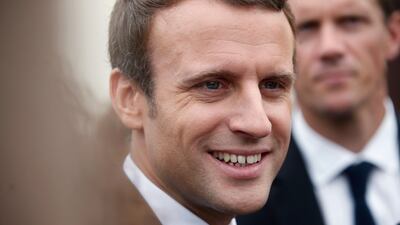As disgruntled voters in the West demand alternatives to the political mainstream they accuse of failing them, the far left and far right have become a good deal more susceptible to volatile public opinion.
But what term best suits 39-year-old France's new president Emmanuel Macron, broadly if a little implausibly – given his past roles in banking and government – part of the shift away from the established order?
He occupies central political ground. But the early signs that he can be as dogmatic as the rest suggest that he may represent a new doctrine, the hard centre.
As Mr Macron cruised to victory in May, great weight was attached to the promise of renewal and change. His success, quickly followed by a strong parliamentary majority for his fledgling party, La République En Marche (Forward the Republic), was little short of sensational, if marred by high abstention.
But the honeymoon period is already over. Polls show him to have lost more support in his first two months in office – a 10 per cent drop – than any president since Jacques Chirac 22 years ago.
So what has gone wrong, and is the slump cause for serious concern or a meaningless blip?
At least two factors fuel the misgivings that have so swiftly appeared since the euphoria of his emphatic defeat of the Front National – and therefore far right – leader Marine Le Pen for the presidency.
Firstly, he has experienced an almost Trump-scale string of key departures. Secondly, in part linked to the first, he displays a streak of authoritarianism that few expected. This plays well with those who believe France cries out for the smack of firm government, but outrages a sizeable minority that sees rebelliousness as not only a virtue but a republican right.
When picking fights with the media – suspicion that he was trying to dictate which correspondents news organisations sent on presidential assignments and a minister's bodged attempt to start criminal proceedings against newspapers over leaked policy documents – Mr Macron's administration probably felt safe from public disapproval. But slapping down a popular chief of armed forces, Pierre de Villiers, over spending cuts, and the five-star general's piqued resignation, raised rather more eyebrows.
The left-leaning Libération accused Mr Macron of running France as if directing Apple or Google and advised him to "grow up a little". From the right, Le Figaro asked whether the "Macron machine" had shuddered to a halt.
The president can argue that his approval rating (54 per cent) remains at a level his predecessor, the hapless socialist François Hollande, could barely dream of. He impresses foreign leaders and made useful progress when hosting the Paris talks that produced agreement on a ceasefire in Libya.
But once the summer ends, he faces tough tests at home as he strives to deal with issues damaging to the French economy but notoriously difficult to resolve.
The unions are implacably hostile to planned reforms of pensions and employment law. A turbulent autumn of discontent – translated as disruption to transport and other services, accompanied by demonstrations liable to turn violent – lies ahead.
Mr Macron insists his will, backed by a democratic mandate, must prevail. In that respect, his hard centre is little different from the conventional left and right of previous governments. And presidents have a habit of ultimately bowing to the fury of the street.
France's youngest president in history has boundless ambition. The country is about to discover whether he also has the acumen to overcome the tallest obstacle to his project: a very French tendency to support reforms as long as they affect only others.

Macron’s popularity slides, but is this a temporary blip or cause for concern?
The new French president has boundless ambition, but he faces a tough autumn ahead
Most popular today
5
